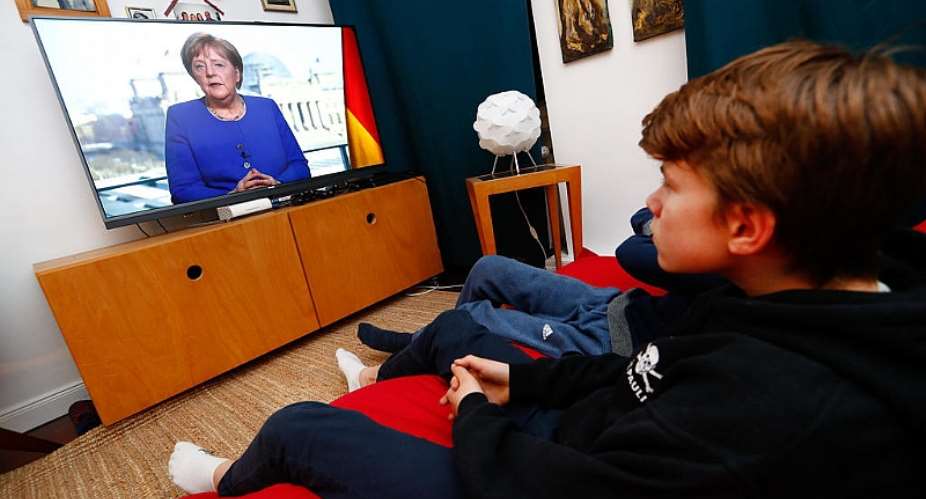Germany says it has coronavirus under control and is starting a partial lift of lockdown measures on Monday, with smaller shops in some regions opening up for the first time in a month.
Each of Germany's 16 states are set to remove the restrictions at a slightly different pace.
Chancellor Angela Merkel and regional state premiers announced the decision to reopen last week, though they have been careful to cast it as no more than a cautious first step.
The country has reported 139,897 confirmed cases and 4,294 deaths as of Sunday.
On Friday, the Robert Koch Institute for public health announced that the rate of infection - the number of people each ill person contaminates - had dropped below one for the first time, leading Health Minister Jens Spahn to declare the virus "under control".
The German health ministry also announced on Monday that the country would pay the bills for the 200 European patients suffering from covid-19 who required respiratory aid in German hospitals, and that more patients could be taken on if necessary.
Fragile success
Merkel, who was herself quarantined for two weeks earlier this month before testing negative for the virus, has warned that Germany's success remains "fragile".
The majority of shops smaller than 800 square metres (8,600 square feet) will be allowed to open, in a first wave of relaxations to strict curbs on public life introduced last month.
But in some states such as the capital Berlin, reopening will take a little longer.
The German Trade Association warned Friday of a possible "distortion of competition" but Economy Minister Peter Altmaier defended the 800-square-metre limit, saying that "the belt can only be loosened bit by bit".
No football until August
A ban on gatherings of more than two people and a requirement to stand more than 1.5 metres apart from others in public areas remain in force.
That means that hairdressers, initially deemed an essential business, cannot open until at least 4 May.
Cultural venues, bars, leisure centres and beauty salons will also remain closed for the time being, while large-scale public events such as concerts and football matches have been banned until 31 August.
Schools to open gradually
Schools will also be partially reopened in the coming weeks, with most states set to welcome back older students from 4 May.
Education policy is traditionally decided at state level in Germany, and Bavaria, the region worst hit by the virus so far, will keep its schools closed for an extra week.
On 29 April, regional education ministers are expected to present concrete plans on how social distancing can still be enforced in the classroom.
Germany hopes to combine the lifting of restrictions with a more efficient tracing of the spread of covid-19.
The country hopes to ramp up testing - it has already tested around two million people - and aims to produce around 50 million protective masks, including 10 million of the higher efficiency FFP2 standard a week from August.
Masks strongly advised
Though not yet obligatory, Merkel said her government "strongly advises" wearing a mask in public.
With more movement of the population expected as shops reopen, eastern states Mecklenburg-Vorpommern and Saxony have made masks obligatory on public transport.
In doing so, they have followed the example of the eastern city of Jena, which unilaterally enforced the wearing of masks earlier this month.
According to German media, the city has had no new cases in a week.
(with wires)





 Former Kotoko Player George Asare elected SRC President at PUG Law Faculty
Former Kotoko Player George Asare elected SRC President at PUG Law Faculty
 2024 elections: Consider ‘dumsor’ when casting your votes; NPP deserves less — P...
2024 elections: Consider ‘dumsor’ when casting your votes; NPP deserves less — P...
 You have no grounds to call Mahama incompetent; you’ve failed — Prof. Marfo blas...
You have no grounds to call Mahama incompetent; you’ve failed — Prof. Marfo blas...
 2024 elections: NPP creates better policies for people like us; we’ll vote for B...
2024 elections: NPP creates better policies for people like us; we’ll vote for B...
 Don’t exchange your life for wealth; a sparkle of fire can be your end — Gender ...
Don’t exchange your life for wealth; a sparkle of fire can be your end — Gender ...
 Ghana’s newly installed Poland train reportedly involved in accident while on a ...
Ghana’s newly installed Poland train reportedly involved in accident while on a ...
 Chieftaincy disputes: Government imposes 4pm to 7am curfew on Sampa township
Chieftaincy disputes: Government imposes 4pm to 7am curfew on Sampa township
 Franklin Cudjoe fumes at unaccountable wasteful executive living large at the ex...
Franklin Cudjoe fumes at unaccountable wasteful executive living large at the ex...
 I'll 'stoop too low' for votes; I'm never moved by your propaganda — Oquaye Jnr ...
I'll 'stoop too low' for votes; I'm never moved by your propaganda — Oquaye Jnr ...
 Kumasi Thermal Plant commissioning: I pray God opens the eyes of leaders who don...
Kumasi Thermal Plant commissioning: I pray God opens the eyes of leaders who don...
